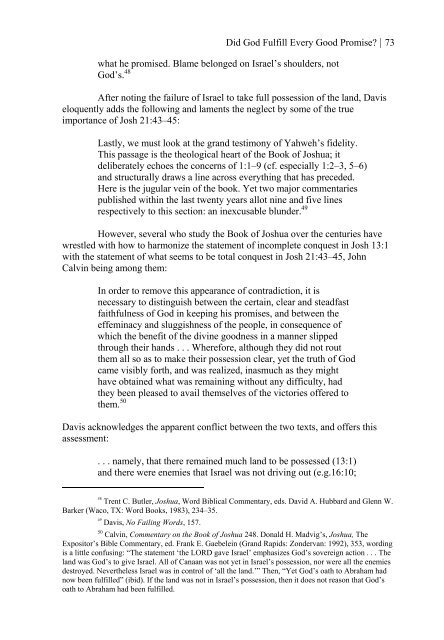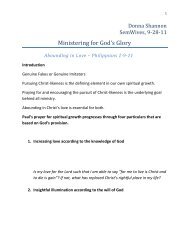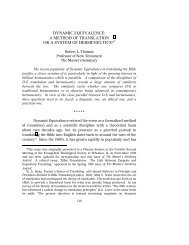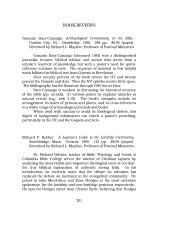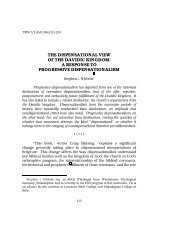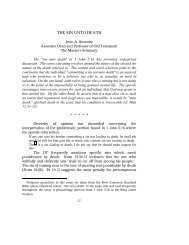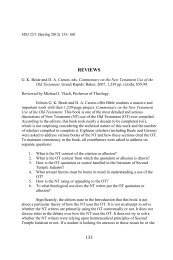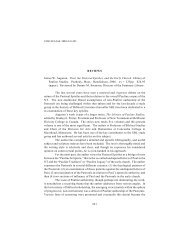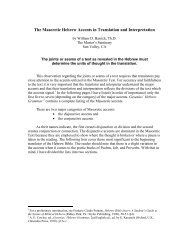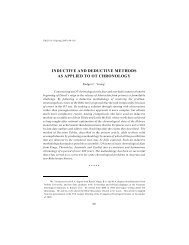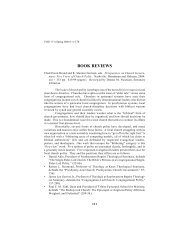Did God Fulfill Every Good Promise? - The Master's Seminary
Did God Fulfill Every Good Promise? - The Master's Seminary
Did God Fulfill Every Good Promise? - The Master's Seminary
Create successful ePaper yourself
Turn your PDF publications into a flip-book with our unique Google optimized e-Paper software.
<strong>Did</strong> <strong>God</strong> <strong>Fulfill</strong> <strong>Every</strong> <strong>Good</strong> <strong>Promise</strong>? | 73what he promised. Blame belonged on Israel’s shoulders, not<strong>God</strong>’s. 48After noting the failure of Israel to take full possession of the land, Daviseloquently adds the following and laments the neglect by some of the trueimportance of Josh 21:43–45:Lastly, we must look at the grand testimony of Yahweh’s fidelity.This passage is the theological heart of the Book of Joshua; itdeliberately echoes the concerns of 1:1–9 (cf. especially 1:2–3, 5–6)and structurally draws a line across everything that has preceded.Here is the jugular vein of the book. Yet two major commentariespublished within the last twenty years allot nine and five linesrespectively to this section: an inexcusable blunder. 49However, several who study the Book of Joshua over the centuries havewrestled with how to harmonize the statement of incomplete conquest in Josh 13:1with the statement of what seems to be total conquest in Josh 21:43–45, JohnCalvin being among them:In order to remove this appearance of contradiction, it isnecessary to distinguish between the certain, clear and steadfastfaithfulness of <strong>God</strong> in keeping his promises, and between theeffeminacy and sluggishness of the people, in consequence ofwhich the benefit of the divine goodness in a manner slippedthrough their hands . . . Wherefore, although they did not routthem all so as to make their possession clear, yet the truth of <strong>God</strong>came visibly forth, and was realized, inasmuch as they mighthave obtained what was remaining without any difficulty, hadthey been pleased to avail themselves of the victories offered tothem. 50Davis acknowledges the apparent conflict between the two texts, and offers thisassessment:. . . namely, that there remained much land to be possessed (13:1)and there were enemies that Israel was not driving out (e.g.16:10;48Trent C. Butler, Joshua, Word Biblical Commentary, eds. David A. Hubbard and Glenn W.Barker (Waco, TX: Word Books, 1983), 234–35.49Davis, No Failing Words, 157.50 Calvin, Commentary on the Book of Joshua 248. Donald H. Madvig’s, Joshua, <strong>The</strong>Expositor’s Bible Commentary, ed. Frank E. Gaebelein (Grand Rapids: Zondervan: 1992), 353, wordingis a little confusing: “<strong>The</strong> statement ‘the LORD gave Israel’ emphasizes <strong>God</strong>’s sovereign action . . . <strong>The</strong>land was <strong>God</strong>’s to give Israel. All of Canaan was not yet in Israel’s possession, nor were all the enemiesdestroyed. Nevertheless Israel was in control of ‘all the land.’” <strong>The</strong>n, “Yet <strong>God</strong>’s oath to Abraham hadnow been fulfilled” (ibid). If the land was not in Israel’s possession, then it does not reason that <strong>God</strong>’soath to Abraham had been fulfilled.


